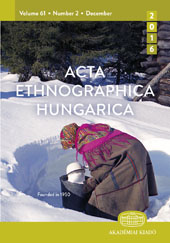Devoting Krishna in a Hungarian Way: Religious and National Identity in the Hungarian Bráhmana Mission A Case Study
Devoting Krishna in a Hungarian Way: Religious and National Identity in the Hungarian Bráhmana Mission A Case Study
Author(s): Nóra KOCSISSubject(s): Cultural history, Social history, Post-Communist Transformation, Hermeneutics, History of Religion
Published by: Akadémiai Kiadó
Keywords: religious identity; national identity; new religious communities; Krishna devotees; interpretive anthropology; post-communism; Central Europe;
Summary/Abstract: The special relationship between religious and national identity is being scrutinised in the present paper. The fieldwork lasted from March 2004 to April 2005 and took place in the city of Szeged in Hungary. A Krishna devotee new religious community called the Hungarian Bráhmana Mission was targeted as this group has a unique combination of the two types of identities. It is postulated that the close relationship between religious and national identities even in new religious groups can be interpreted as a typical phenomenon in post-communist Central European countries, which is justified by the research. The Geertzian, interpretive, hermeneutical method is used during the fieldwork.
Journal: Acta Ethnographica Hungarica
- Issue Year: 51/2006
- Issue No: 1-2
- Page Range: 105-117
- Page Count: 13
- Language: English
- Content File-PDF

